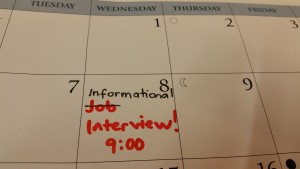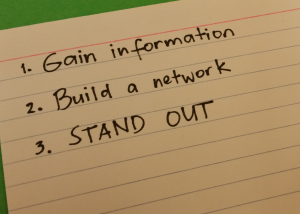Last semester, Rutgers Career Services invited Dan Beaudry, author of Power Ties, to speak to both undergraduate and graduate international students on effective job searching in the US. He began his talk by stating his goals: learn 1) how to invest your (limited) time and avoid common mistakes during your job search, and 2) how to be different (this is important because in 2014, there were an estimated 870,000 international students in the US, majority of which will presumably be looking for a job). He emphasized that as international students, we should stop focusing and worrying about a company’s visa sponsorship status. Instead, the focus should be given to ways on how you can present your POTENTIAL VALUE that will make a company WANT TO SPONSOR YOU.
Out of the many methods and practices that Dan shared to distinguish oneself from other jobseekers, I want to focus on the importance and benefit of informational interviews.
I. Traditional Job Interview vs Informational Interview

A traditional job interview is when someone from the company you are applying, having read your resume and job application, invites you for an interview in order to assess whether or not to give youa job. In contrast, an informational interview is a meeting set up by you to seek information and career advice. Informational interviews can be between you and someone from a company you are thinking of applying to (but haven’t applied to yet!). It can also be a meeting with someone in the same career or industry field that you want to pursue. During his talk, Dan pointed out the advantages of conducting informational interviews over merely relying on traditional interviews. First, you can request an informational interview with whoever you want. Second, you decide the meeting agenda; that is, you are the one asking the questions. Third, a request for an informational interview will almost never be turned down. Why? Because you are allowing people to talk about themselves. In short, in an informational interview, you are in control.
II. Three outputs of a PRODUCTIVE informational interview:
1. Getting information (main point of an informational interview)
As the name implies, an informational interview is mostly for gaining information. If you are interested in applying for a job in a certain company, an informational interview with someone who currently works there can give you an inside look into the company, insight into that person’s own career path and how they got their job. Informational interviews can be conducted over the phone or in person, depending on preference.
2. You let people know that you are looking for a job without putting on the role of job seeker
The very fact that you are setting up informational interviews lets people know that you are in the job hunting process without actually applying for a job. In this way, you have the opportunity to build good relationships with people who may be in the position to hire you once you actually submit your job application. It is one way of standing out in a sea of resumes, and making the extra effort lets people know how much you care and are willing to work for this career, thus ADDING TO YOUR VALUE.
3. Networking
Informational interviews are one of the most direct and efficient ways of networking. You don’t just give someone your business card but actually interact and build a relationship. A good informational interview not only gives you information, but builds a network of advocates who, once you apply for the job, can be a potential ally in highlighting your values. Additionally, it opens up the possibility for referrals. Since the person you conducted an informational interview with already knows your value and you have established a good relationship with them, they can potentially refer you for a job position.
III. Tips for Informational Interviews
1. It is hard work and a long process. Since you are both collecting information and establishing relationships and networks, expect to put in a lot of effort; however, the outputs outlined above are certainly worth your time. An informational interview is certainly going to be more productive than, say, browsing the internet for job postings and submitting your resumes online.
2. Be who you are. Know what your interests are, and follow them. You will be much more relaxed and more capable of revealing your skills and value if you are being yourself. Be genuinely interested in the people you are meeting and what they have to share with you, and this will be easier if you are passionate about what they are passionate about.
3. Follow up. As mentioned before, you are building a relationship with this person. As soon as possible after the meeting, either send a short email or, if necessary, ask for a follow-up meeting. Have something of value to say in the follow up, such as a short summary of what the most important point of the meeting was for you. You can also use this to set up the NEXT informational interview by asking the person if they know someone else that you can talk to.

In conclusion, informational interviews are a great way for you 1) to gain insight into a particular job or career, 2) build a solid professional network, and most importantly, 3) reveal your value and stand out.